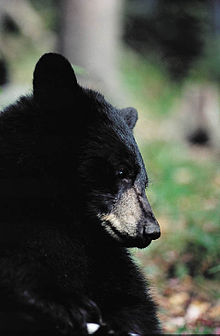lokys
Jump to navigation
Jump to search
Lithuanian
[edit]
A Black Bear
Etymology
[edit]From Proto-Baltic *tlāk- (with reduction of the “difficult” cluster tl to l), and cognate with Latvian lācis, Old Prussian clokis (klokis) (< *tlokis), Tlokunpelk (“Prussian placename”, literally “bear swamp”), Sudovian łukas. The term replaced the original word for bear, Proto-Indo-European *h₂ŕ̥tḱos (which may have survived as a fossilized compound in the word irštvà (“bear's den”), as part of a taboo seen in many other other Indo-European branches. The Baltic terms are of unclear further origin:[1]
- Perhaps related to Proto-Slavic *dòlka (“hair”), assuming an earlier form of *tlaka for the Slavic. This is preferred by Derksen.
- Connected to làkti (“to lick, lap”), with bears being conceived as “(honey) lickers”; this is formally irreconcilable with the Old Prussian cognate above.
- According to Kortlandt, related to tìlti (“to become silent”), assuming an earlier form of tìlkti for the latter. This is phonetically bold and semantically tenuous.
- Smoczynski, doubting the originality of the anlaut tl- of the Old Prussian forms, instead derives the Baltic terms from an originally adjectival unattested compound žmoglokỹs (“man-mauling”) > "man-mauler", with the initial part of the compound (žmogùs (“human”)) dropping out, taking the second part as being from Proto-Indo-European *leh₂k- (“to tear, rend”) and comparing Latin lacer (“lacerated”). This assumption regarding the Old Prussian anlaut is phonetically bold, and the derivation from *leh₂k-, otherwise unattested in Baltic, is somewhat ad hoc.
Pronunciation
[edit]Noun
[edit]lokỹs m (plural lokiaĩ) stress pattern 3
Declension
[edit]Declension of lokỹs
| singular (vienaskaita) | plural (daugiskaita) | |
|---|---|---|
| nominative (vardininkas) | lokỹs | lokiaĩ |
| genitive (kilmininkas) | lókio | lokių̃ |
| dative (naudininkas) | lókiui | lokiáms |
| accusative (galininkas) | lókį | lókius |
| instrumental (įnagininkas) | lókiu | lokiaĩs |
| locative (vietininkas) | lokyjè | lokiuosè |
| vocative (šauksmininkas) | lokỹ | lokiaĩ |
Derived terms
[edit]References
[edit]- ^ Derksen, Rick (2015) “lokys”, in Etymological Dictionary of the Baltic Inherited Lexicon (Leiden Indo-European Etymological Dictionary Series; 13), Leiden, Boston: Brill, →ISBN, page 291
